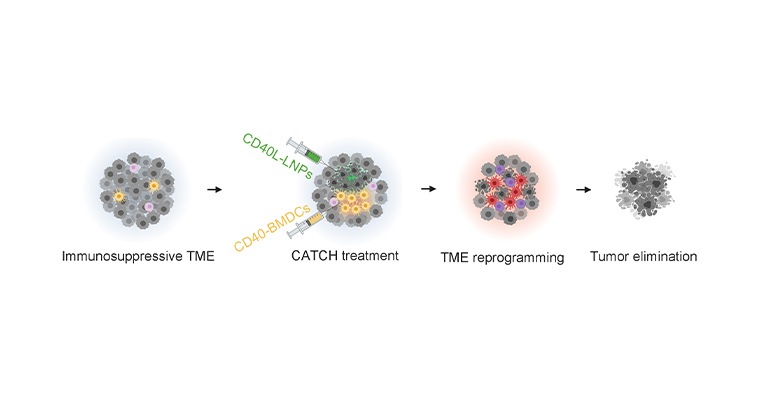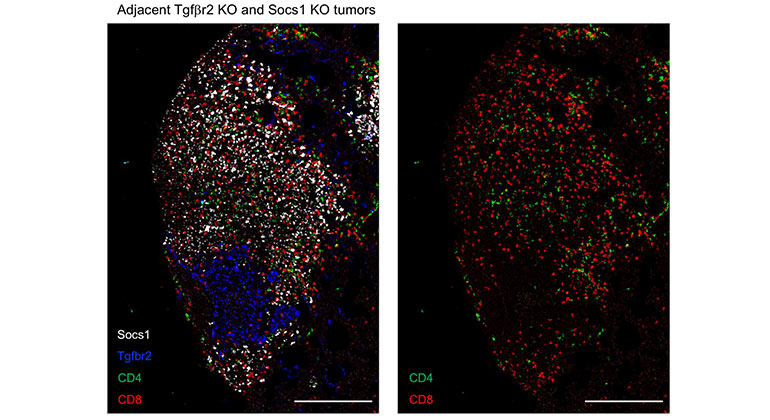Mount Sinai Researchers Report Clinical Utility of Personalized Medicine Program for Cancer Patients
Scientists from the Icahn School of Medicine at Mount Sinai developed and tested a personalized cancer therapy program using an integrated genomic approach that led to therapeutic recommendations for 91 percent of patients. In a paper released today in Genome Medicine, they report results of the pilot program and show that multidimensional genomic profiles outperform the targeted cancer panels in use at many clinical labs today.
The genetic variants specific to a patient’s tumor are important for guiding the choice of cancer treatment. As DNA sequencing has become more affordable, clinical labs rapidly adopted targeted sequencing panels which scan tumor DNA for some variants known to cause cancer. In the personalized cancer therapy program at Mount Sinai, researchers generated much more data about the genetic makeup of both patients and their tumors to determine whether this in-depth characterization led to better results.
“There is tremendous interest in tailoring cancer treatment for each patient, since every tumor has its own unique signature of genetic variants that shape progression and response to therapy,” said senior author of the study Rong Chen, PhD, Assistant Professor of Genetics and Genomic Sciences and Director of Clinical Genome Informatics at the Icahn Institute at Mount Sinai. “We launched this program with the idea that a more comprehensive view of that variant signature would make a difference in patient treatment, but even we were surprised by just how much is being missed with current testing.”
The scientists analyzed whole exomes, gene expression, copy number variation, and gene fusions of both tumor samples and matched normal samples for an initial group of 46 patients. Participants had a wide range of cancer types — including colon, thyroid, and breast — and many were in advanced stages of the disease. In 42 of the 46 cases, the integrated genomic profile led to medically actionable genetic variants with implications about drug response, toxicity, or prognosis. The team also ran commercially available targeted cancer panels for each sample, finding that these tools failed to detect medically actionable variants for many patients. All results were returned to patients and their physicians, and in several cases the information led to changes in treatment.
“The argument against this integrated approach is the added cost of using multiple analysis platforms. But for patients battling cancer, it’s hard to put a price on information that may lead to more successful outcomes,” said Eric Schadt, PhD, the Jean C. and James W. Crystal Professor of Genomics at the Icahn School of Medicine at Mount Sinai, and Founding Director of the Icahn Institute for Genomics and Multiscale Biology. “We believe labs could maximize benefit by implementing a staggered approach, starting with targeted panels and incorporating multiscale characterization for patients lacking medically actionable variants.”
Paper cited:
Andrew V. Uzilov, Wei Ding, et al. Development and clinical application of an integrative genomic approach to personalized cancer therapy. Genome Medicine. DOI: 10.1186/s13073-016-0313-0
About the Icahn School of Medicine at Mount Sinai
The Icahn School of Medicine at Mount Sinai is an international leader in medical and scientific training, biomedical research, and patient care. It is the medical school for the Mount Sinai Health System, an integrated health care system which includes seven hospitals and an expanding ambulatory network serving approximately 4 million patients per year.
The School has more than 1,800 students in MD, PhD, and Master’s programs and post-doctoral fellowships; more than 5,600 faculty members; over 2,000 residents and fellows; and 23 clinical and research institutes and 34 academic departments. It is ranked among the highest in the nation in National Institutes of Health funding per principal investigator. The School was the first medical school in the country to create a progressive admissions approach for students who seek early assurance of admission through the FlexMed program.
The Graduate School of Biomedical Science trains PhD and MD/PhD students, and offers master’s-level programs in areas such as genetic counseling, clinical research, biomedical sciences, and public health, and an online master’s degree in health care delivery leadership. The seamless connections between our medical school, graduate school, and hospital campuses provide an extraordinary environment for translating scientific discoveries into clinical treatments.
For more information, visit http://icahn.mssm.edu or find the Icahn School of Medicine at Mount Sinai on Facebook, Twitter, YouTube, and LinkedIn.
# # #
About the Mount Sinai Health System
Mount Sinai Health System is one of the largest academic medical systems in the New York metro area, with more than 43,000 employees working across eight hospitals, over 400 outpatient practices, nearly 300 labs, a school of nursing, and a leading school of medicine and graduate education. Mount Sinai advances health for all people, everywhere, by taking on the most complex health care challenges of our time — discovering and applying new scientific learning and knowledge; developing safer, more effective treatments; educating the next generation of medical leaders and innovators; and supporting local communities by delivering high-quality care to all who need it.
Through the integration of its hospitals, labs, and schools, Mount Sinai offers comprehensive health care solutions from birth through geriatrics, leveraging innovative approaches such as artificial intelligence and informatics while keeping patients’ medical and emotional needs at the center of all treatment. The Health System includes approximately 7,300 primary and specialty care physicians; 13 joint-venture outpatient surgery centers throughout the five boroughs of New York City, Westchester, Long Island, and Florida; and more than 30 affiliated community health centers. We are consistently ranked by U.S. News & World Report's Best Hospitals, receiving high "Honor Roll" status, and are highly ranked: No. 1 in Geriatrics and top 20 in Cardiology/Heart Surgery, Diabetes/Endocrinology, Gastroenterology/GI Surgery, Neurology/Neurosurgery, Orthopedics, Pulmonology/Lung Surgery, Rehabilitation, and Urology. New York Eye and Ear Infirmary of Mount Sinai is ranked No. 12 in Ophthalmology. U.S. News & World Report’s “Best Children’s Hospitals” ranks Mount Sinai Kravis Children's Hospital among the country’s best in several pediatric specialties.
For more information, visit https://www.mountsinai.org or find Mount Sinai on Facebook, Twitter and YouTube.

New RNA-based Therapy Combats Melanoma in Mouse Models
Jul 27, 2023 View All Press Releases
Targeting One Type of Immune Cell With Another Slows Cancer Growth in Preclinical Studies
Oct 25, 2022 View All Press Releases
Novel CRISPR Imaging Technology Reveals Genes Controlling Tumor Immunity
Mar 15, 2022 View All Press ReleasesMount Sinai Researchers: Why COVID-19 May Be Less Common in Children Than Adults
May 22, 2020 View All Press ReleasesAirway Microbiome and Host Interact Differently in Children with Severe Asthma
Mar 12, 2020 View All Press Releases

